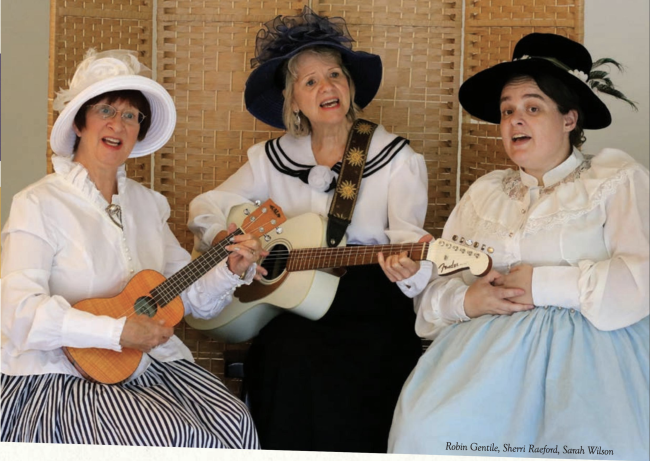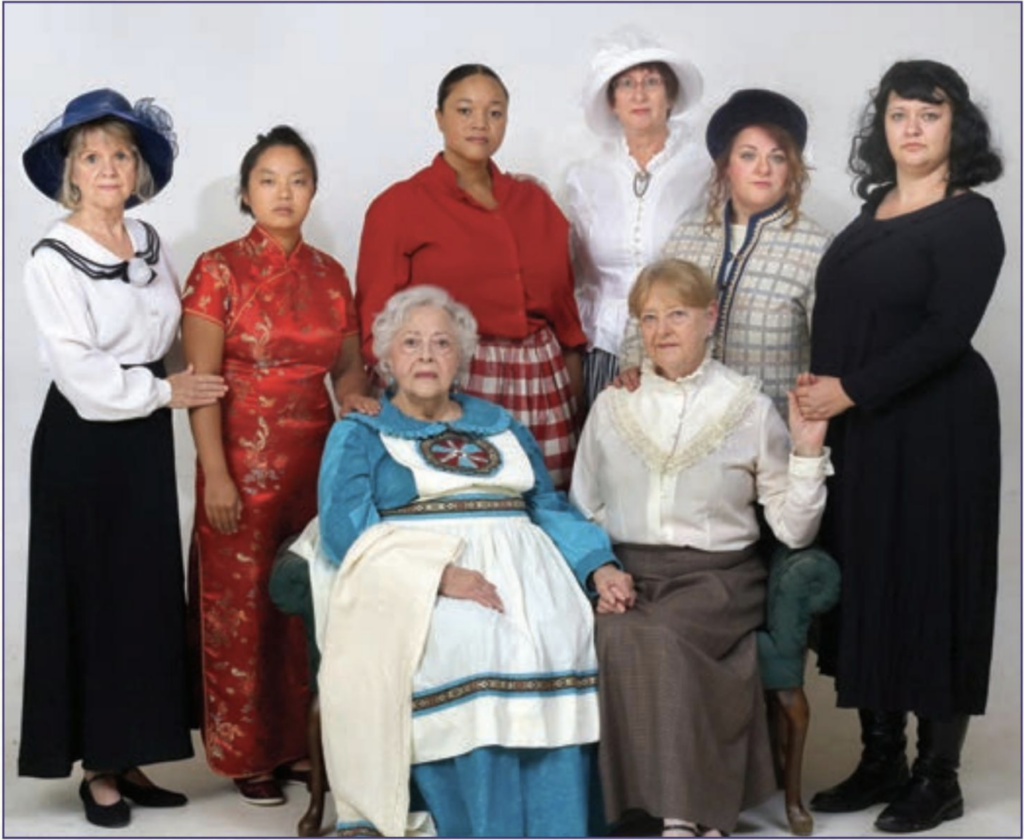USE YOUR VOICE

Use Your Voice
A new production celebrates the suffragettes
By Cynthia Adams
When director, musician and playwright Sherri Raeford was invited to dramatize the struggles “of courageous and resolute women of North Carolina to obtain equal rights” she was struck by the diversity of the those who pioneered the right to vote for women in the state. Many of the stories were Asian, Black, Jewish, Native American, Immigrant Irish and white Americans, she learned.
American Association of University Women North Carolina (AAUW NC) president Cheryl Wheaton envisioned a 2020 performance to be given in Raleigh at the Governor’s Mansion for a special centennial. Raeford, who thrives on group projects, was elated that the diverse group of women she pulled into the project were loving it, too — so much that they agreed to even be cast members. The writers included Jalila A. Bowie, Sheryl Davis, Patsy Hawkins, Ruan Walker, Lennie Singer, Chappell Upper and, of course, Raeford.
“The original idea was to envision women at the Governor’s Mansion on the 100th anniversary of women’s suffrage,” she says. Raeford is owner of Shared Radiance Performing Arts Company, which she founded after years directing the North Carolina Shakespeare Festival.
Underwritten by a grant award from the AAUW and later supplemented by High Point nonprofit Women in Motion, or WIM, the original work, Sisters of Mine; Hear the Voices, will finally come to the stage at two Triad locations on August 24 and 29 after COVID disrupted that original production.
Raeford has spent years researching and dramatizing events surrounding the passage of the 19th amendment. Ratified on August 26, 1920, the centennial observation — four years after the fact — will serve to mark Women’s Equality Day.
She held developmental meetings in her Pleasant Garden studio.
“A lot of the women who contributed [to suffrage] were women of color, and I didn’t want to write other people’s stories.”
That was then.
“When [the project] began,” she recalls, it was exhilarating. “There was a lot of momentum.” Raeford sighs. “Then COVID hit.”
With the pandemic raging, the group attempted collaborating on Zoom rather than in person. That proved difficult, Raeford admits. The production lost steam as the pandemic ground on. Eventually, the project stalled.
Raeford grieved a bit, then “let it lie for a few years.” She regrouped as best she could during the pandemic, staging open air company productions in the interim. Best known for bringing classical and original works to students and into the general community, Raeford’s company, Shared Radiance, is a member of the North Carolina Theatre Conference and the Shakespeare Theatre Association.
Shared Radiance productions frequently use outdoor locations, including parks and public space, where the audience follows the actors from scene to scene. So, using the outdoors as the stage was nothing new to her.
Open air performance, as it turned out, was a godsend during the pandemic.
Shared Radiance board member Martha Yarborough had learned about the developing production during those COVID-era Zoom meetings. Almost immediately, she grasped that the theme of women’s equality was a fit with another organization, WIM, a leadership initiative founded in 2015. She felt WIM would instantly see the production was “about finding a voice.”
Yet Sisters of Mine might never have found its voice, Raeford stresses, if not for renewed interest from AAUW NC. “The AAUW Greensboro branch recommissioned the production to highlight today’s equity issues for women,” the organization explained recently in a release.
With AAUW’s renewed interest, Raeford was further buoyed when WIM sought a second performance in High Point for their organization.

As a result, Sisters of Mine could stage two Triad performances bookending Women’s Equality Day on August 26.
Linking two of her passions, theater and leadership, Yarborough is delighted that Sisters of Mine reemerged following a dramatic five-year disruption.
“Since 2000,” says Raeford, “Martha has been my muse.” A former educator, Yarborough played a supportive role for a former student, this time by calling Sisters of Mine to the attention of WIM’s director, Pam Baldwin, and fellow board members.
WIM decided to use Sisters of Mine to announce 2024 grant winners in conjunction with the performance and “use it as a special platform for an annual event as well,” says Baldwin. She explains that the organization serves to elevate and support women in achieving professional goals, which seemed a natural fit for the premise of the play.
“The play speaks to the importance of using your voice and being empowered. One way you can exercise your voice is by voting . . . which these women [suffragettes] fought for.” And there is a dramatic tie-in with WIM.
“Half of our organization’s member dues go into a giving pool,” she says, in discussing WIM’s grant process. Each year the membership votes on allocation of monies raised.
“Obviously, because the women in our organization get to vote on all grants,” the production’s theme of voting rights suited their purpose.
“So, tying all that in and making the celebration of the grant [awards] just elevates it. We’re coming together, talking about our mission, who we are and what we do, and also have a program that they can enjoy as well. It came about organically.”
She adds, “We want them to come, to learn about us, and see where their money would go as a member.” She liked the idea of free admission, following the lead of the AAUW’s premiere in Greensboro.
“Rather than charging as a fundraiser, we want to flip the script a little [by offering free admission].”
Their hope? That mothers and daughters, women from all walks of life, will attend the play.
Yarborough agrees with Baldwin, envisioning that a performance about the rights of women “will illustrate Women in Motion’s collaboration with other groups.”
Today, Sisters of Mine is not the traditional play it began as. While the original premise of the suffragette-themed work has morphed into a performance piece with original music, it still cleaves closely to the original concept — reflecting “women of diverse histories” seeking equality, according to playwright Raeford.
She is pleased that the handpicked collaborators authentically reflect the varied background of the original suffragettes, calling it a “performance collage.”
Raeford, who is an avid musician and composer, wrote an original song for the play based on the poem “Sisters of Mine” by North Carolina poet Barbara Henderson, who “had written poems about the suffragette movement.” After composing the music, Raeford asked musician Robin Gentile to help arrange the song, and to perform it on flute and guitar.
With five years elapsed, the core group changed. Their post-pandemic life circumstances altered. One of the original writers moved away.
Again, Raeford regrouped, assembling a “multi-generational cast,” some in their 20s and others in their 70s. The Sisters of Mine cast includes original writers and cast as well as new cast members Jamila Curry, Robin Gentile, Cynthia Reichelson and Sarah Wilson. Understudies Camille Christina, Candace Hescock, Grace Kanoy and Kelly Kerr will be waiting in the wings. Sarah Wilson is the stage manager.
“The beauty of the generations is also the beauty of women . . . all taking care of each other,” explains Raeford.
“This is what this is all about,” adds Yarborough, connecting the struggle for parity in the workplace and as individuals. “Fighting for our rights. Using your voice.
